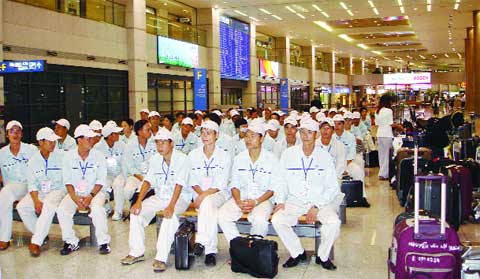Remittances help to fortify foreign exchange levels
Vietnam has enjoyed a big surge in overseas remittances, on the back of a positive global economy, helping it secure forex levels.
 Vietnamese workers’ stellar work ethic make them popular choices for foreign labour hires |
“The number is really impressive. We all know the flows traditionally surge in the year’s end and the number in the second half could be larger,” said Duong Thu Huong, Vietnam Banking Association’s (VNBA) general secretary.
However, according to the State Bank, just 10 per cent of the remittances was sold to the banking system. Nguyen Thi Kim Thanh, head of Banking Development Institute, said the State Bank should work out appropriate measures to encourage people to sell these mounts to the banking system.
“People still opt to keep overseas remittances in cash or in deposit accounts,” said Thanh. In 2009, overseas remittances totaled $6.3 billion and Tran Hoang Ngan, a member in the National Monetary Consultancy Board, said that the total amount in 2010 should far surpass $6 billion.
“Overseas remittances always play an important role in stabilising the local foreign exchange market. This is a secure and risk-free inflow,” Ngan said.
Over the first six months of 2010, Vietnam’s trade deficit reached $6.5 billion, far higher than $2.1 billion in the first half of 2009.
“The dramatic difference was partly due to some large one-off exports of precious metals in 2009. The improvement in export growth and the slowdown in import growth have helped to keep the country’s deficit position stable. The first half performance is largely in line with our full-year trade deficit forecast of $13 billion,” said Tai Hui, Standard Chartered’s head of research for South East Asia.
Disbursed foreign direct investments (FDI) in the first half of 2010 hit $5.4 billion, a 6 per cent year-on-year increase. “The combination of improving inflows and stable trade deficit should bode well for currency stability,” Hui concluded.
Standard Chartered’s research team expected FDI disbursement improve to $11-12 billion in 2010 from $9 billion in 2009, supported by the global recovery.
“Although balance-of-payments dynamics remain challenging for the Vietnamese dong, we expect them to improve this year. As such, we see developments in Vietnam’s balance-of-payments as a modest short-term positive for the dong,” said Hui.
Last month, the International Monetary Fund commented that the level of Vietnam’s foreign exchange reserves had fallen to seven weeks’ worth of imports. The State Bank later clarified that reserves should cover nine weeks’ worth of imports and the authority aimed to raise this to 12 weeks by the end of the year.
What the stars mean:
★ Poor ★ ★ Promising ★★★ Good ★★★★ Very good ★★★★★ Exceptional
 Tag:
Tag:
Related Contents
Latest News
More News
- Cashless payments hit 28 times GDP in 2025 (February 04, 2026 | 18:09)
- SSIAM and DBJ launch Japan Vietnam Capital Fund (February 04, 2026 | 15:57)
- Banks target stronger profits, credit growth in 2026 (February 04, 2026 | 15:43)
- Vietnam on path to investment-grade rating (February 03, 2026 | 13:07)
- Consumer finance sector posts sharp profit growth (February 03, 2026 | 13:05)
- Insurance market building the next chapter of protection (February 02, 2026 | 11:16)
- NAB Innovation Centre underscores Vietnam’s appeal for tech investment (January 30, 2026 | 11:16)
- Vietnam strengthens public debt management with World Bank and IMF (January 30, 2026 | 11:00)
- Corporate bond market poised for stronger growth cycle (January 28, 2026 | 17:13)
- Vietnam's IPO market on recovery trajectory (January 28, 2026 | 17:04)






















 Mobile Version
Mobile Version